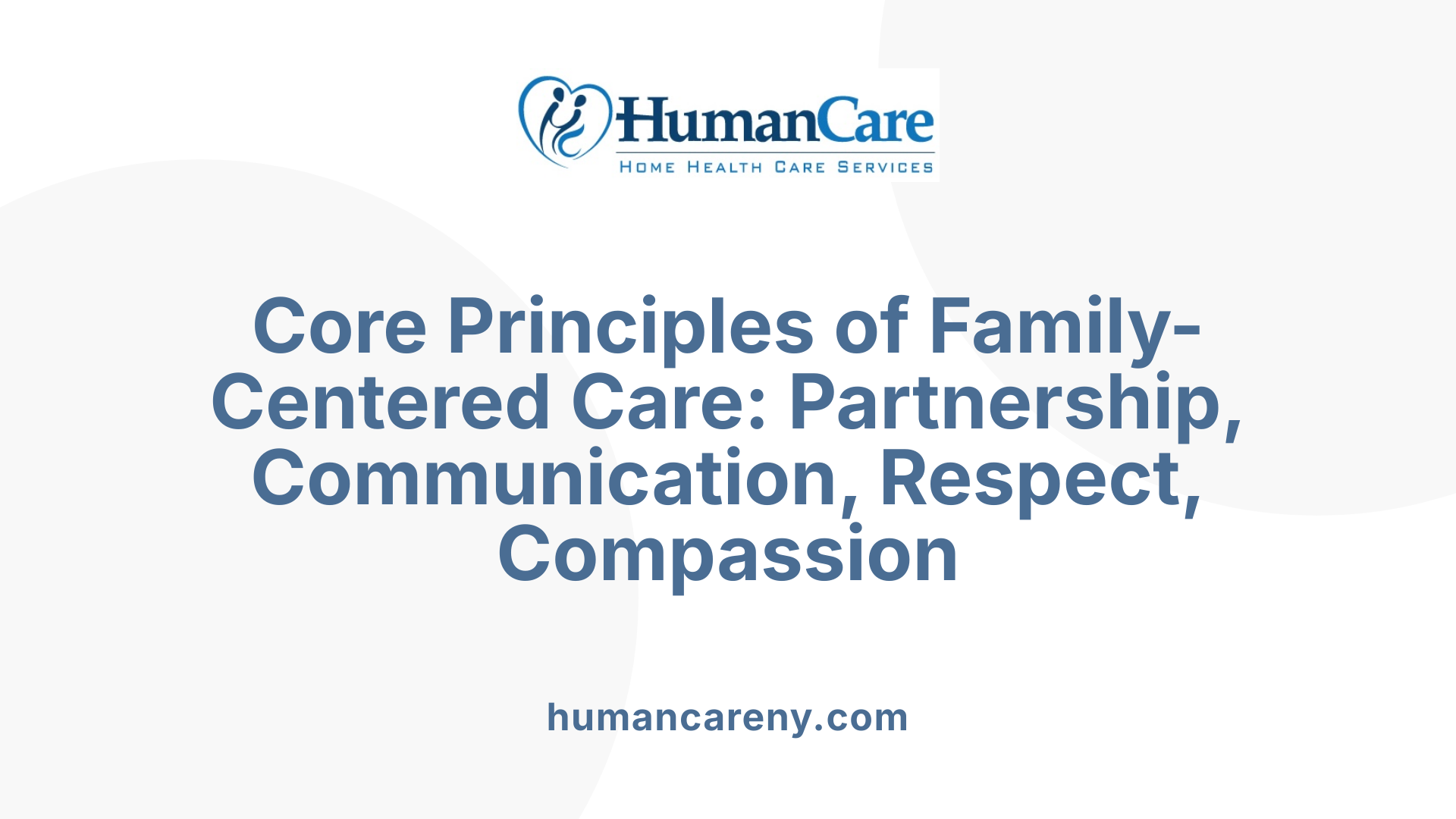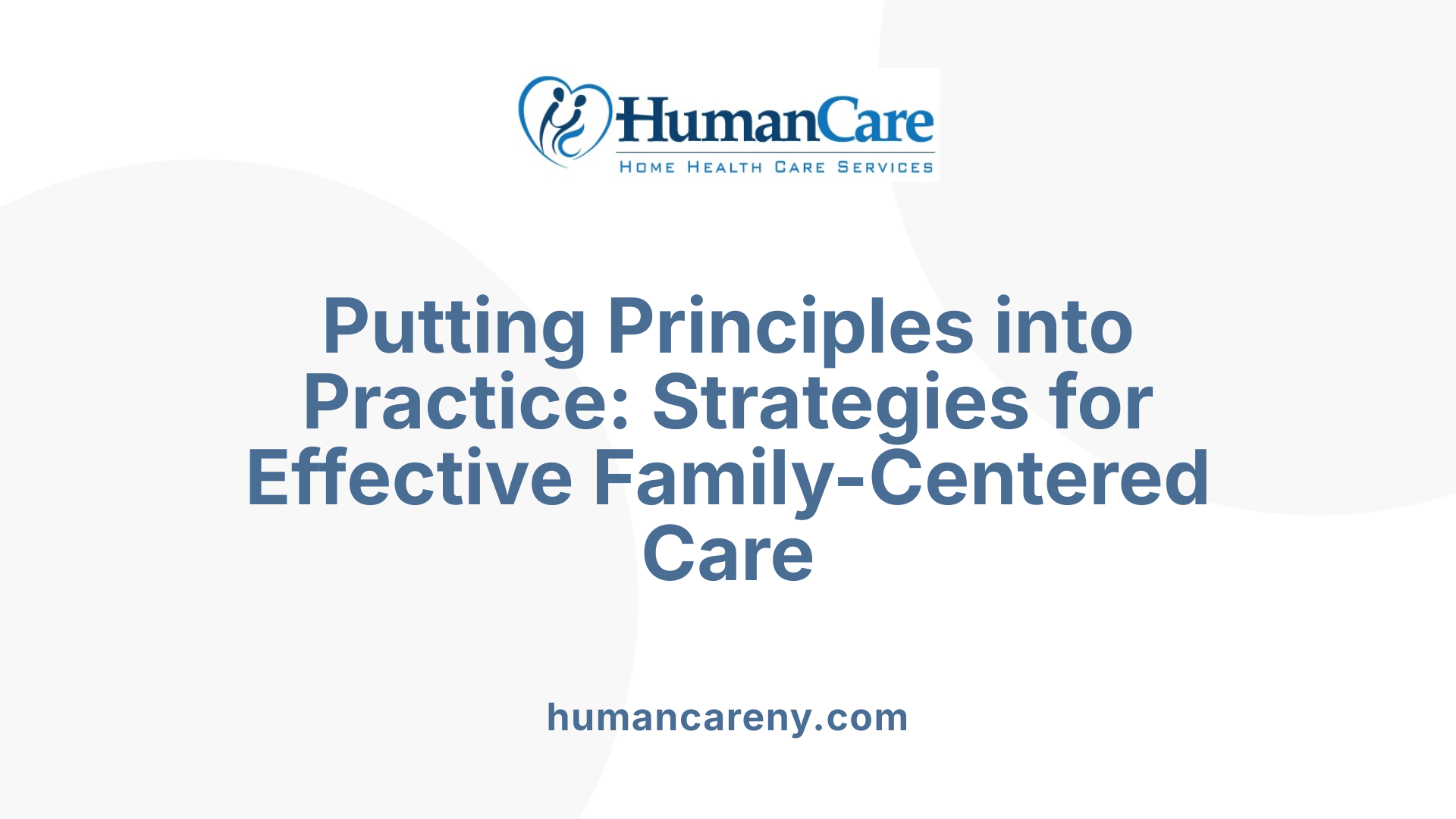Understanding the Shift to Family-Centered Pediatric Healthcare
Pediatric healthcare has evolved significantly with the recognition that involving families actively in care enhances outcomes and satisfaction. Family-centered care (FCC), rooted in principles of partnership, communication, respect, and compassion, has become a cornerstone in delivering holistic and effective pediatric services, especially when care extends into the home environment. This article explores how pediatric home care fosters family-centered care, highlighting its principles, implementation strategies, and profound impact on children and their families.
Fundamentals of Family-Centered Care in Pediatrics

What are the core principles of family-centered care in pediatrics?
Family-centered care (FCC) in pediatrics is grounded in principles that prioritize the active involvement of families in the child's health journey. The core attributes include partnership, communication, respect, and compassion. These attributes foster a collaborative environment where families and healthcare providers work together effectively.
Partnership involves recognizing families as equal partners who bring valuable insights about their child's needs. Open and honest communication ensures families are well-informed and can participate meaningfully in decision-making. Respect entails honoring families' cultural backgrounds, preferences, and emotional bonds with their children. Compassion guides providers to deliver care that is empathetic, tailored, and responsive to individual family situations.
Fundamentally, FCC relies on principles such as transparent information sharing, respecting differences among families, and fostering collaboration across all aspects of care. These principles underpin practices like family involvement in care routines, shared decision-making, and policy development.
Understanding and embracing family strengths and cultural backgrounds is essential. Such recognition supports personalized care plans that respect diverse values and practices, enhancing trust and cooperation.
Implementing FCC benefits all parties. It can improve health outcomes, elevate satisfaction levels, and create a supportive environment that promotes emotional and psychological well-being.
| Attribute | Description | Additional Details |
|---|---|---|
| Partnership | Families and providers actively collaborate in care processes | Recognizing families as essential team members |
| Communication | Open, honest exchange of information | Ensures understanding and shared knowledge |
| Respect | Valuing family diversity, preferences, and emotional connections | Honoring cultural, spiritual, and personal values |
| Compassion | Empathy-driven approach tailoring care to family and patient needs | Providing supportive, individualized care |
This comprehensive framework guides pediatric healthcare towards more inclusive, effective, and compassionate practices, emphasizing that families are vital partners in fostering the health and resilience of young patients.
Antecedents and Foundations of Family-Centered Care

Why is family-centered care important in pediatric healthcare settings?
Family-centered care (FCC) is essential in pediatric healthcare because it acknowledges the family as a child's primary support system. By involving families actively in decision-making, healthcare providers can better tailor treatments to the child's unique needs and family circumstances.
This approach fosters collaboration, mutual respect, and open communication, which are critical for building trust between families and health professionals. When families are engaged, they can share valuable insights about the child's behavior and health, enabling more accurate assessments and effective care plans.
Implementing FCC enhances safety, improves health outcomes, and supports the child's overall well-being. It also reduces parental anxiety and stress, increases satisfaction with care, and promotes adherence to treatment routines.
Moreover, this care model aligns with ethical principles of respect and compassion, emphasizing that children and their families are partners in healthcare decisions. Overall, FCC creates a safer, more responsive, and effective pediatric healthcare environment.
What are the attributes that define patient and family-centered care?
The four main attributes of FCC include partnership, communication, respect, and compassion. These elements are vital for creating a trusting relationship, and they guide how healthcare professionals interact with families.
- Partnership encourages ongoing collaboration and shared decision-making.
- Communication involves open, honest, and transparent information exchange.
- Respect requires honoring family differences, cultural practices, and individual preferences.
- Compassion reflects understanding, emotional support, and kindness towards families.
These fundamental qualities help ensure that care is personalized, effective, and family-approved.
What are the antecedents that support the implementation of family-centered care?
Successful implementation of FCC depends on several foundational factors. These include active family involvement, families' readiness to participate, and clinicians’ competence and willingness to embrace the model.
A supportive environment is crucial, comprising policies that promote family engagement and facilitate collaborative practices. Healthcare settings that foster teamwork and prioritize family participation are more likely to see positive outcomes.
Historical development also played a significant role, with family advocates and policy changes pushing the shift from family relegation to partnership. These advocates highlighted the importance of viewing families as integral to children’s healthcare decisions and wellbeing.
By establishing policies and cultivating an environment that emphasizes collaboration, healthcare systems set the stage for effective FCC implementation, improving patient safety, satisfaction, and health outcomes.
How do organizational policies and environment influence family-centered care?
Supportive policies and healthcare environments directly impact FCC practices. Reimbursement models that incentivize family participation, staff training in family engagement, and resources dedicated to communication are essential.
An environment that values transparency and respects cultural diversity promotes open dialogue, making families feel valued and empowered.
Policies that endorse family-centered rounds (FCR) and continuous caregiver engagement further embed FCC into daily practice. Over time, these institutional supports foster a culture where family involvement is standard, leading to better care coordination and outcomes.
What is the historical role of family advocates and policies in developing FCC?
Historically, family advocates have been instrumental in shaping FCC principles. Their efforts transitioned the perception of families from passive recipients to active partners.
Through advocacy and policy development, families helped establish rights for involvement in clinical decisions and service planning. This shift was supported by research demonstrating that family participation improves health outcomes and enhances the care experience.
Today, policies increasingly reflect this partnership philosophy, emphasizing family feedback, cultural competence, and collaborative care models. The evolution continues to embed family-centered principles into healthcare practice and policy, maintaining the focus on families as vital contributors to their children's health and wellbeing.
Implementation of Family-Centered Care in Pediatric Settings

How is hospital-based family-centered rounds (FCR) used to support FCC?
Family-centered rounds (FCR) are a practical implementation of FCC within hospital settings. During FCR, families participate directly in discussions about the child's care at the bedside, fostering transparency and collaboration. This model allows healthcare providers to share important health information openly, listen to family insights, and address questions in real time.
Involving families in bedside discussions enhances understanding, supports shared decision-making, and strengthens trust between families and the medical team. It also ensures that care plans are aligned with family preferences and cultural contexts, making the care more personalized and effective.
How is FCC integrated into the medical home model?
The medical home model is central to FCC, aiming to provide comprehensive, coordinated, and continuous care that respects family needs and values. This model emphasizes easy access to healthcare services, personalized care plans, and cultural competence.
In practice, this involves regular communication, shared decision-making, and ongoing feedback from families. Healthcare providers serve as trusted partners, working collaboratively with families to organize care routines, monitor development, and manage health in a way that fits into daily family life.
What role do tele-interventions and community resources play?
Tele-interventions have greatly expanded FCC's reach by offering remote support, education, and consultation. They improve access to specialized care, especially for families in underserved or rural areas, and facilitate ongoing communication between families and healthcare providers.
Community resources, including social services, support groups, and educational programs, complement tele-interventions by addressing social determinants of health. This holistic approach ensures families receive the necessary resources and emotional support, reinforcing a framework of trust and partnership.
How do families participate in daily routines and decision-making?
Active family participation is vital for effective FCC. Families integrate care routines such as medication management, therapy exercises, and monitoring into daily life, ensuring continuity and adherence. Their involvement helps in early observation of health and behavioral changes, promoting timely interventions.
Furthermore, families serve as advocates, collaborating with healthcare teams to access resources and tailor care plans that respect cultural and individual preferences. This partnership fosters emotional support, reduces stress, and supports the child's developmental and health outcomes.
Supporting Families Through Home Care and Community Engagement
Pediatric home care programs prioritize family participation by providing education, resources, and flexible service delivery models. These programs promote the integration of care into the home environment, supporting physical, emotional, and developmental health.
Family involvement in home care increases adherence to treatment plans, enhances understanding, and reduces hospitalizations. Utilizing technology such as telehealth, these programs overcome barriers to traditional care, ensuring continuous, family-centered support tailored to each child's unique needs.
| Aspect | Implementation Strategies | Outcomes | Additional Details |
|---|---|---|---|
| Hospital-based FCR | Bedside participation, open communication | Better understanding, trust | Real-time updates and family engagement |
| Medical home integration | Coordinated care plans, regular feedback | Continuous, personalized care | Focus on accessibility and cultural competence |
| Tele-interventions | Remote consultations, educational apps | Improved access, engagement | Especially useful in underserved areas |
| Family daily involvement | Routine care, advocacy, cultural tailoring | Better compliance, emotional support | Enhances child health and family resilience |
These strategies exemplify how family-centered care becomes a practical, effective approach across pediatric healthcare settings, leading to improved outcomes and more satisfying experiences for families and providers alike.
Benefits of Family Participation and Engagement
What benefits does family participation provide in pediatric home health care?
Family involvement in pediatric home health care is essential for promoting the overall well-being and recovery of medically fragile children. When families actively participate, they can observe subtle health, behavioral, and developmental changes, enabling early detection of potential issues. This proactive engagement allows for timely interventions, reducing complications and improving health outcomes.
Active family participation also fosters better adherence to prescribed treatment plans. Families can carry out medication regimens, therapeutic exercises, and monitor medical equipment effectively, ensuring the child receives consistent and effective care at home.
Emotionally, family members provide vital psychological support, reducing feelings of isolation, anxiety, and depression for both the child and caregivers. This emotional nurturing helps create a stable environment conducive to the child's growth and development.
Moreover, involving families in care routines supports the child's physical, emotional, and developmental milestones. Families incorporate therapeutic activities into daily life, boosting growth and learning.
Families serve as advocates, working closely with healthcare professionals and social services to navigate resources and obtain additional support. This advocacy ensures holistic care that extends beyond medical treatment, including social and community resources.
Another significant benefit is improved care coordination, especially during transitions between different care settings. Families help ensure continuity of care, adapting routines and environments as the child grows, which leads to smoother care experiences.
In summary, family participation in pediatric home health care enhances health outcomes, promotes safety, and builds a strong foundation for long-term well-being. It empowers families, strengthens partnerships with healthcare teams, and ultimately creates more tailored, effective, and compassionate care for children.
Role of Family Engagement in Outcomes and Care Quality
What is the role of family engagement in improving health outcomes through pediatric home care?
Family involvement is fundamental in achieving better health results for children receiving pediatric home care. When families actively participate in daily routines, they can observe subtle health and behavioral changes early, enabling prompt intervention. This proactive involvement helps ensure adherence to treatment plans, including medication administration and therapy exercises, which enhances overall effectiveness.
Engaged families also foster emotional support, reducing feelings of isolation and anxiety. This emotional bond promotes cooperation with care routines and contributes to the child's mental health. Additionally, family members help tailor care to the child's individual needs, routines, and cultural practices, making care more relevant and effective.
Research indicates that active family participation leads to increased advocacy, better care coordination, and safer environments at home. Families work hand-in-hand with healthcare providers to ensure consistent care, which stabilizes health conditions and prevents complications.
Technological tools and supportive policies are increasingly used to promote family engagement. These innovations help families stay connected with healthcare teams, access information easily, and monitor health data remotely. Ultimately, such involvement reduces emergency visits, hospitalizations, and healthcare costs, while improving satisfaction among caregivers and children.
Supporting Emotional Well-being
Family participation also plays a vital role in emotional health. Providing emotional support helps reduce stress and anxiety, fostering a positive environment for healing. When families are empowered and informed, they feel more confident in managing their child's health, creating a supportive, trusting relationship with healthcare providers.
Strengthening Advocacy and Resource Access
Families serve as advocates, navigating social services and securing resources beyond medical treatment. This advocacy ensures holistic support for the child's physical, emotional, and developmental needs.
Enhancing Safety and Adherence
Family members monitoring home environments can quickly identify safety hazards, ensuring the child's environment remains safe. Their role in consistent care routines directly impacts adherence to medical and developmental plans.
Fostering Trust and Collaboration
Building strong, collaborative relationships between families and healthcare teams fosters trust. This partnership enhances communication, encourages questions, and supports shared decision-making, all essential for personalized, effective care.
Challenges and Opportunities in Family-Centered Pediatric Care

What barriers to family-centered care exist, and how can they be addressed?
Family-centered care (FCC) faces several obstacles that hinder its optimal implementation. One significant barrier is the misunderstanding of FCC principles among healthcare providers and administrators. Without clear comprehension, FCC practices may be inconsistently applied or undervalued.
Additionally, inadequate support and reimbursement policies can discourage healthcare facilities from prioritizing FCC. Policies that do not provide adequate funding or incentives for family involvement limit the scope of family participation in care routines and decision-making.
Another challenge is the absence of validated metrics and outcome measures to evaluate the effectiveness of FCC. Without standardized tools, it is difficult to assess whether FCC practices truly improve health outcomes and patient satisfaction.
Addressing these barriers involves several strategic actions. Healthcare providers require comprehensive education to deepen their understanding of FCC principles and practices. This education can foster more consistent application of family-centered approaches.
Policy reforms are essential to create a supportive environment. Reimbursement models should incentivize FCC activities, making family participation financially sustainable for healthcare institutions.
Furthermore, the development and implementation of standardized, validated measurement tools are crucial. Such metrics would enable healthcare teams and policymakers to objectively evaluate FCC's impact and drive continuous improvement.
By promoting research into effective FCC models and fostering evidence-based strategies, the healthcare community can overcome current barriers. Recognizing FCC as a fundamental component of pediatric care ensures that children and families receive holistic, respectful, and collaborative support.
The Future of Family-Centered Pediatric Care and Pediatric Nursing

How do educational programs like UTA’s MSN emphasize family-centered care?
UT Arlington’s online Master of Science in Nursing (MSN) program integrates family-centered care (FCC) principles through coursework on ethics, advocacy, cultural competence, and collaborative practice. These courses prepare future pediatric nurses, especially those in advanced roles like nurse practitioners, to deliver holistic, respectful, and culturally sensitive care. Focus is placed on developing communication skills, fostering trust, and engaging families as active partners in health decisions. As a result, graduates are equipped to promote emotional support, shared decision-making, and personalized care plans that meet diverse needs.
Why is culturally competent care essential in FCC?
Cultural competency ensures that pediatric care respects and honors the unique backgrounds, traditions, and values of families. Incorporating cultural literacy into FCC helps healthcare providers communicate effectively, understand family dynamics, and reduce disparities. This approach fosters trust and increases family satisfaction, making care more accessible and equitable. As families come from varied cultural contexts, this competence becomes vital to tailor interventions, promote adherence, and improve health outcomes.
What is the role of advanced practice nurses in advocacy and leadership?
Advanced practice nurses (APNs) play a critical role in advocating for family rights and leading FCC initiatives. They serve as liaisons, ensuring families’ voices are heard in care planning and policy development. APNs also spearhead efforts to create supportive environments, implement innovative models like family-centered rounds, and influence healthcare policies to support reimbursement and support systems. Their leadership fosters a culture of collaboration, respect, and continuous quality improvement in pediatric care.
How might emerging technologies and innovative care models shape the future of FCC?
Emerging technologies, such as telehealth, mobile health apps, and electronic health records, enhance communication and information sharing between families and healthcare teams. These tools facilitate real-time updates, remote consultations, and personalized health tracking, empowering families to participate actively in care. Innovative models like hybrid family-centered rounds leverage technology to include families in discussions regardless of physical presence, improving engagement and satisfaction. Combining these advancements with ongoing research and policy reforms will expand access, improve coordination, and elevate family-centered practices.
| Aspect | Impact | Details |
|---|---|---|
| Educational Programs | Prepare nurses | Focus on ethics, advocacy, cultural competence |
| Cultural Competency | Ensures inclusivity | Respects family diversity for better engagement |
| Nurse Leadership | Champions FCC | Advocates for policies, fosters collaboration |
| Technology & Innovation | Enhances engagement | Telehealth, digital tools for shared decision-making |
The future of family-centered pediatric care and nursing hinges on education, cultural competency, leadership, and technology. These elements collectively support the ongoing evolution of FCC into a more inclusive, accessible, and effective model of care.
Advancing Pediatric Care through Family Partnership
Implementing and promoting family-centered care within pediatric home settings is essential for delivering holistic, respectful, and patient-tailored healthcare. When families actively participate and collaborate with healthcare teams, children receive more effective care, experience better health outcomes, and enjoy increased satisfaction and safety. Overcoming barriers like policy limitations and enhancing provider education will ensure that FCC remains a fundamental component of pediatric practice. As healthcare advances, integrating innovative models, leveraging technology, and fostering Cultural competence will further embed family-centered principles, ultimately shaping a future where children and their families are at the heart of pediatric health care.
References
- Patient and family-centered care for children: A concept ...
- Family-Centered Care: Current Applications and Future ...
- How Family Participation Improves Pediatric Home Health
- About Family-Centered Care
- Understanding Family-centered Care in Pediatrics - UTA Online
- Family-Centered Care in Pediatrics: 5 Nursing Principles
- Family-Centered Care: Current Applications and Future ...
- Patient and Family-Centered Medical Home



